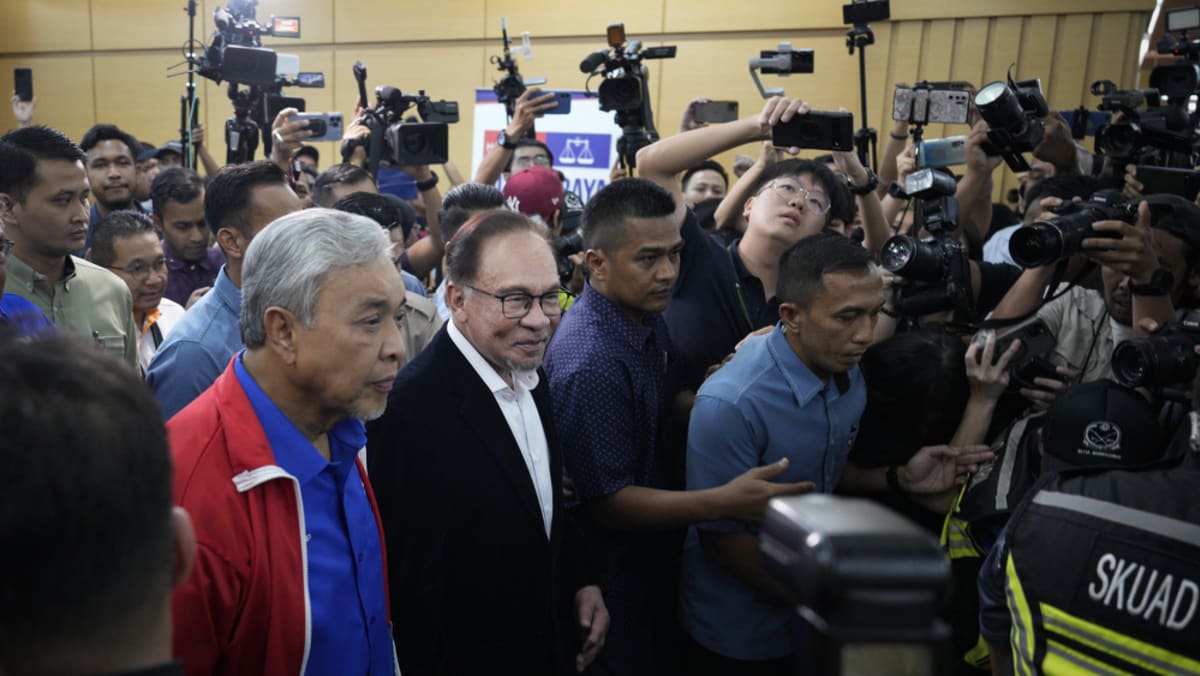KUALA LUMPUR: Malaysian Prime Minister Anwar Ibrahim’s Pakatan Harapan (PH) coalition government fought off a major assault by the opposition in the six state assembly elections on Saturday (Aug 12) to comfortably ward off any potential threat to the national leadership. But the humiliating electoral setbacks suffered by the United Malays National Organisation (UMNO) is presenting Mr Anwar with some very awkward challenges in the coming months.
The sweeping rejection UMNO suffered in the Malay-dominated states of Kedah, Kelantan and Terengganu has further cemented the widely held view that the party, which fought for independence in 1957, has been reduced to a marginal player in national politics. Of the 108 seats that UMNO and its partners in the National Front (Barisan Nasional) coalition contested in the state polls, it only won 19.
UMNO and its president Ahmad Zahid Hamidi played key roles in Mr Anwar’s rise to the premiership after the inconclusive November general elections.
It was only after UMNO threw its support behind the PH coalition to establish a simple majority in parliament that other reluctant regional parties in Sabah and Sarawak followed suit and paved the way for the formation of a government with a two-thirds majority. UMNO’s crucial role in the process also afforded it senior roles in the PH coalition government.
Now, Mr Anwar must now reconsider UMNO’s dominant role in his government. Embattled UMNO president Ahmad Zahid is one of Malaysia’s two deputy prime ministers and several party politicians occupy senior Cabinet portfolios, including the Investment, Trade and Industry and the Defence ministries.
A Cabinet reshuffle in the coming weeks is not being ruled out.
INTERNAL STRIFE IN UMNO
To be sure, Mr Anwar’s position as premier and his government’s hold on power are in no threat. The weekend’s elections also very much retained the political landscape that held before the dissolution of the assemblies in late July.
The PH coalition kept control of Selangor, Negeri Sembilan and Penang, while Kelantan, Terengganu and Kedah went back to the right-wing Parti Islam Se-Malaysia (PAS), which is the dominant member of the opposition Perikatan Nasional (PN) coalition together with Parti Pribumi Bersatu Malaysia (Bersatu).
“PH and Anwar did alright by retaining the states they controlled, and the government can move ahead. But for UMNO, I am not so sure,” UMNO’s former treasurer Abdul Zahim Mohd Zabidi told CNA, adding that rumblings of an internal rebellion in the party have already begun.
“Unless there is some leadership change, UMNO is doomed,” he added.
UMNO, which ruled Malaysia with the leadership of the National Front (Barisan Nasional) coalition since independence, was kicked out of power in May 2018 on the back of widespread public anger over the international scandal at state-owned 1Malaysia Development Bhd (1MDB). The financial fiasco subsequently led to the conviction and jailing of former UMNO president and Malaysia prime minister Najib Razak over corruption.
DOUBTS OVER AHMAD ZAHID
Mr Ahmad Zahid subsequently took over the party leadership and consolidated his power by removing his opponents and packing the leadership of the powerful 25-member supreme council body with his allies. But the party no longer endears itself to the Malay community and that, in turn, has become a serious problem for Mr Anwar, who is struggling to build his government’s own credentials with the majority Malay community.
Related:
Commentary: What impact do state elections have on Malaysians anyway?
Commentary: Anwar’s struggle to maintain political stability in Malaysia
Mr Ahmad Zahid’s presence in government has long been controversial because he is facing charges of corruption and the trial is ongoing. Even Mr Anwar’s closest supporters have privately stated that Mr Ahmad Zahid’s role in government undermines the prime minister’s tough stance on the abuse of power and political corruption.
Mr Anwar had campaigned in recent weeks for Malaysians, particularly the Malays who make up more than 60 per cent of the country’s 33.57 million people, to break away from the politics of race and religious rhetoric promoted by the opposition.
But UMNO leaders acknowledge that unless a leadership change takes place soon, the prospect of the party renewing its appeal with ordinary Malays is remote.
“The problem is the Zahid leadership and the party will continue to be rejected as long as there is no change,” said a senior party official, who asked not to be named.
Leslie Lopez is a senior correspondent at CNA Digital who reports on political and economic affairs in the region.





.png?itok=q8K6cCPl)

